Nursing Homes Fail to Report Deaths, Injuries
Nursing homes can ignore federal law, while new state system can fail to detect problems. Part II of a series.
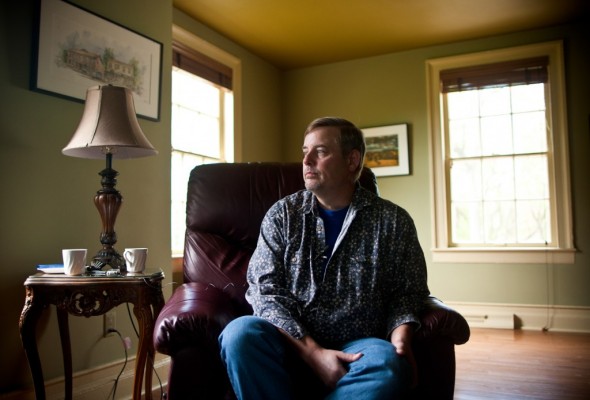
Charles Pietrowski’s mother, Mary, fell and broke her hip at Sunrise Care Center in Milwaukee in January 2010. The nursing home did not report the incident to the Wisconsin health department, as required by law, and the state did not investigate the injury for more than seven months, the Wisconsin Center for Investigative Journalism found. The state later determined that Pietrowski fell due to negligence. Lukas Keapproth/Wisconsin Center for Investigative Journalism
A FRAIL SYSTEM
About this series:Families’ abilities to hold potentially negligent nursing facilities accountable have been diminished by a recent change in state law that bars records of abuse and neglect from use in the courts, the Wisconsin Center for Investigative Journalism has found. The Center’s investigation also shows that some long-term care facilities are failing to report deaths and injuries, as required by law. This project, A Frail System, explores those issues and offers families help in identifying which of the state’s nursing homes have been sued or cited for major problems.
DAY 1: New State Law Conceals Nursing Home Violations
DAY 2: Nursing homes fail to report deaths, injuries
Sidebars:
- Center’s inquiries prompt state policy changes
- What to do if you suspect neglect or abuse
- How tort reform bill changed state law
- How to find nursing home inspection reports
• Interactive data:
Explore the lawsuits brought against nursing homes in Wisconsin since 1986.

Richard Witt thought his wife was lucky.
Over the course of 18 years, Kathy Witt was diagnosed with five types of cancer: ovarian, brain, cervical-spine, spine, breast. In 2008, at the age of 65, she had survived them all. Doctors called her the “miracle lady,” Richard Witt said.
On March 21, 2008, she was admitted to Mayville Nursing and Rehabilitation Center in Mayville, about an hour’s drive northwest of Milwaukee. Among other ailments, she suffered from hypotension, or severe low blood pressure, causing dizziness whenever she sat up or stood.
Four days later, something went terribly wrong.
Witt pressed the call light in her room. No one is sure how long she waited for help; estimates have ranged from five to 20 minutes. Finally she tried to get up unassisted, fell and hit her head on the floor.
Mayville and other nursing homes that receive Medicare and Medicaid are required by federal law to report all instances of alleged mistreatment, neglect or abuse, including injuries of unknown origin, to the state health department’s Division of Quality Assurance within 24 hours.
But an investigation by the Wisconsin Center for Investigative Journalism found that Mayville never reported Witt’s fall to the state, and there are no plans to punish Mayville for that failure.
It is not the only such case.
In response to inquiries from the Center, the Wisconsin Department of Health Services confirmed that KindredHearts, an assisted living facility in Green Bay, failed to report a resident’s death after a 2008 fall that the state determined occurred due to neglect. KindredHearts was cited in that case, according to the state.
Assisted living facilities have seven days to report incidents. The state may then investigate the facility and levy fines or other penalties.
And the state confirmed that Sunrise Care Center, a nursing home in Milwaukee, did not report a January 2010 incident in which a resident fell and fractured her hip, an injury the state later attributed to negligence. The state fined Sunrise for failing to report the incident to the state, failing to develop plans to prevent abuse and neglect, and failing to follow the resident’s care plan.
After health department staff confirmed these three cases, agency spokeswoman Claire Smith declined to do so for more than a dozen other potential instances, identified by the Center, in which serious injuries or deaths related to abuse or neglect may not have been reported. Smith cited a 2011 memo from the federal government that barred the release of records that reveal patient names.
As a result of the Center’s investigation, the Department of Health Services says it has reformed its intake procedures to ensure that complaints against nursing homes are prioritized appropriately and investigated in a timely fashion. (See details in related story.)
Attorneys for families of residents say that facilities’ failure to report serious injuries or deaths related to abuse or neglect is not uncommon. Far more often, they say, the state health department only learns about a case of alleged neglect or abuse after a family member files a complaint.
“The insidious thing about facilities not reporting incidents is that there’s no way to know what’s not getting reported,” said Ann Jacobs, a Milwaukee personal injury attorney. “People should be outraged. The only way a family member can try to determine if a facility is safe is by reviewing these reports.”
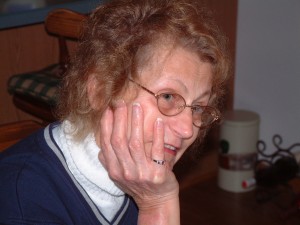
Kathy Witt in 2006. In March 2008, she fell at Mayville Nursing and Rehabilitation Center in Mayville, Wis., hit her head, and died the next day. Mayville did not report the incident to the state health department and the state never investigated. Witt’s widower, Richard Witt, later sued Mayville for wrongful death and settled out of court. Photo courtesy of Richard Witt.
Advocates for health care providers stress that incidents of neglect and abuse are extremely rare, and can come to regulators’ attention in a variety of ways.
“Any system will have instances of breakdown,” said Tom Moore, executive director of the Wisconsin Health Care Association, a nonprofit group that represents long-term care providers. “To suggest that this is representative is reprehensible.”
Moore has calculated that Wisconsin long-term care facilities provide 23 million patient days each year — often to people who require around-the-clock care, at reimbursement rates that necessarily limit provider resources. He noted that a 2011 study by the American Association of Retired Persons ranked Wisconsin fifth best in the country for affordable high-quality care.
And, he added, if a facility doesn’t report an incident to the state health department, families can file complaints or civil lawsuits.
In all, at least 297 civil suits alleging negligence, wrongful death or medical malpractice have been filed against long-term care facilities in Wisconsin since 1986, a Center review found. (See interactive map).
“It’s very important that attorneys are able to take these cases and hold those who neglect and abuse the elderly accountable,” said Dane County Circuit Judge William Hanrahan, who prosecuted crimes against the elderly for 19 years as a district attorney and assistant attorney general. “Some of the biggest changes come as a result of legal action.”
‘She was on the floor’
On March 24, 2008, three days after Kathy Witt was admitted to Mayville, Richard Witt kissed his wife of 44 years goodnight and tucked her in.
“I told her I loved her and waved goodbye,” he said. “The next time I saw her, she was on the floor.”
Nearly five years later, he cannot shake the guilt and regret. If he had arrived at Mayville five minutes earlier, could he have saved her life?
“You drive yourself crazy, thinking you could have prevented what happened,” he said.
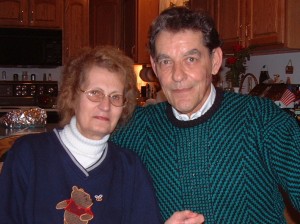
Kathy and Richard Witt in 2006. In March 2008, Kathy Witt fell at Mayville Nursing and Rehabilitation Center in Mayville, Wis., hit her head, and died the next day. Mayville did not report the incident to the state health department and the state never investigated. Richard Witt later sued Mayville for wrongful death and settled out of court. Photo courtesy of Richard Witt.
He visited her every day, sometimes twice a day, for 18 years, as Kathy was in and out of hospitals and rehab. Often he slept in a cot in her room. When he couldn’t be with Kathy overnight, he made sure she had the bowl of ice cream she loved before bed.
Some nights she would cry and hold his hand, apologizing for putting him through so much. “I’m sorry you’re going through this,” he would tell her. “Don’t worry about me.”
He said he found her semi-conscious in her room just past 4 p.m. on March 25, with several caretakers present. He recalled that one told him, “She couldn’t have fallen more than five minutes ago.”
By the time Kathy was flown to Froedtert Hospital in Milwaukee, it was too late. She had suffered a subdural hematoma, causing her brain to shift to one side. She died the next day.
Records show that after Kathy pushed her call light, a therapist walked past her room and saw her sitting on the side of the bed. The therapist called a nurse. By the time the nurse arrived, Kathy was on the floor.
Health department spokeswoman Smith confirmed that Mayville never reported Kathy Witt’s fall to the state, and that the agency never knew she fell. Smith said the state will not investigate Mayville, explaining that the health department does not investigate a facility if no one files a complaint within 12 months of an incident.
Richard Witt filed a wrongful death lawsuit against Extendicare, the Ontario-based company that owns Mayville, on Jan. 20, 2011. The case was dismissed in March 2012 after a settlement was reached, the presiding judge’s office confirmed, but terms were not available.
Extendicare declined to comment, citing resident and employee privacy concerns. Spokeswoman Holly Gould would not discuss why the facility failed to report Witt’s fall.
“We are very proud of the care provided by our caregivers,” she said in a statement, saying that Mayville is “in compliance with all state and federal regulations.”
Regulators may never know
Federal law requires that federally certified nursing homes — those that accept Medicaid and Medicare — be inspected every nine to 15 months. Nursing homes that are not federally certified must be inspected every two years, according to state law.
During an inspection, a state health team tours the nursing home, reviews records and interviews a sample of residents and staff to assess medical care, sanitation, measures taken to prevent neglect and abuse, and other facility practices.
The state sends a letter to the facility identifying violations; the nursing home then has 10 days to submit a written plan explaining how it will remedy the problems.
But surveyors cannot catch everything. If a facility fails to report a resident’s injury or death to the health department and the state never receives a complaint from the public — like what happened at Mayville — regulators may never know an incident occurred.
In some cases, nursing homes file internal reports after a resident injury or death, but do not report the incident to the state, because administrators do not believe the facility is at fault.
That is what happened after Mary Pietrowski, 88, broke her hip at Sunrise Care Center in Milwaukee on Jan. 14, 2010. A state investigation conducted more than seven months after the incident found that she fell while a nursing assistant was helping her get to the bathroom.
But the nursing notes for Jan. 14 make no mention of Pietrowski’s fall.
Pietrowski’s care plan stipulated that two staff members must assist whenever she was moved. The nursing assistant who was with Pietrowski when she fell admitted that she knew a second person should have been helping her, the state report shows.
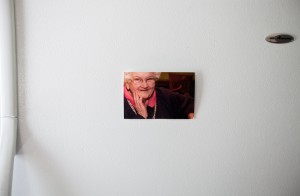
A photo of Mary Pietrowski hangs on her son’s refrigerator in Rochester, Wis. She fell and broke her hip at Sunrise Care Center in Milwaukee in January 2010. The nursing home did not report the incident to the Wisconsin health department, as required by law, and the state did not investigate the injury for more than seven months, the Wisconsin Center for Investigative Journalism found. The state later determined that Pietrowski fell due to negligence. Lukas Keapproth/Wisconsin Center for Investigative Journalism
Sunrise completed an internal report following Pietrowski’s fall, records show. But the facility administrators did not report the injury to the health department “because they did not perceive it to be neglect,” the state investigation found. The health department only learned about the incident after Pietrowski’s son filed a complaint.
Following a state investigation, Sunrise was ordered to pay $17,422 in federal and state fines for multiple violations, including three in relation to Pietrowski’s fall. The facility was also barred from offering a nurse aide training and competency evaluation program for two years.
Sunrise Care Center is owned by Extendicare, the same company that owns Mayville Nursing and Rehabilitation Center. Extendicare owns 31 facilities throughout the state.
Extendicare spokeswoman Gould declined to comment, again citing resident and staff privacy concerns. She said Sunrise Care Center is fully compliant with state and federal regulations.
In January, Pietrowski’s son filed a personal injury lawsuit against Sunrise Care Center, alleging negligence and seeking compensatory damages. The case is pending in Milwaukee County Circuit Court.
State court records show that more than 30 personal injury, wrongful death or medical malpractice lawsuits have been filed against Extendicare since 1986.
Complaints up, inspectors down
Moore, of the Wisconsin Health Care Association, argued that long-term care facilities are subject to intensive scrutiny and record keeping. “What goes on in a nursing home is more transparent than what goes on in any other health care setting, because of the regulatory systems in place,” he said.
But critics say making state investigation reports of nursing homes inadmissible in civil and criminal lawsuits — a change that took effect after Wisconsin adopted tort reform legislation in 2011 — means that more cases of alleged neglect or abuse will go undetected and unpunished.
“Especially if it’s a Medicaid facility, I really believe transparency is essential,” Hanrahan said. “We need to see how tax dollars are being spent and what quality of care is being provided.”
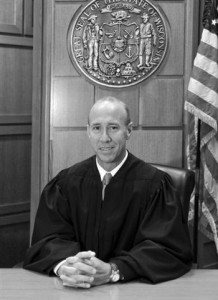
“There are witness statements in state inspection reports. You can’t replace those,” said Dane County Circuit Judge William Hanrahan, who prosecuted crimes against the elderly for 19 years as a district attorney and an assistant attorney general. Photo courtesy of countyofdane.com.
In fact, the Wisconsin health department has cut its staff of full-time nursing home surveyors from 100 in 2002 to 64 in 2012. Smith said staff was reduced because the number and capacity of nursing homes in Wisconsin have decreased. She provided data showing that, during this same period, the number of facilities fell from 412 to 398, and that resident capacity declined from 43,268 to 35,183.
The drop in inspectors (36 percent) was greater than the drop in facilities (3 percent) or capacity (19 percent).
Meanwhile, the number of complaints the state received about Wisconsin nursing homes and assisted living facilities rose from 1,684 in 2000 to 2,562 last year — an increase of more than 50 percent.
Since 2009, state inspectors have found serious deficiencies — problems that pose immediate jeopardy to a resident’s health or safety — in about a quarter of Wisconsin’s federally certified nursing homes, a review of federal records showed.
And with an aging baby-boomer population, some say keeping a close watch on long-term care facilities will only grow more important. A state report found that Wisconsin will have 1.3 million residents over 65 by 2030, compared to about 777,000 residents in 2010.
“You have a huge wave of baby boomers, and this has got to be an issue that’s on the front burner of policy makers,” Hanrahan said. “I can’t see this problem getting any better on its own.”
Witt agrees, saying that when injuries occur because duties were neglected, “that’s a serious fault, and it’s got to be dealt with. You have to try to stop it from happening again and again.”
Center’s inquiries prompt state policy changes
In response to the Wisconsin Center for Investigative Journalism’s inquiries into an accident involving a 88-year-old woman at a Milwaukee nursing home, the state Department of Health Services launched an internal review, which concluded that state officials did not properly respond.
As a result, the department says it has reviewed its intake procedures and made changes to ensure that complaints against nursing homes are triaged appropriately and investigated in a timely fashion.
“Complaint and triage assignments are now completed by our management staff,” said health department spokeswoman Claire Smith, adding that these officials are trained in obtaining detailed information from the person filing the complaint.
The accident involved Mary Pietrowski, who fell and broke her hip at Sunrise Care Center in January 2010. The facility did not report the incident to state officials, and the state did not launch an investigation for more than seven months, even though Pietrowski’s son said he filed a complaint within a month of her fall.
The health department review found that the complaint against Sunrise was “inappropriately triaged by intake staff,” causing a delay in the state investigation, Smith said.
She said the department’s goal is to investigate serious complaints filed against nursing homes within 10 days of receipt, and non-serious allegations within 60 days of receipt. Similar timelines are set for assisted care facilities.
Extendicare, the Ontario-based company that owns Sunrise Care Center, declined to comment on Pietrowski’s fall, citing patient and staff privacy concerns.
The nonprofit Wisconsin Center for Investigative Journalism (www.WisconsinWatch.org) collaborates with Wisconsin Public Radio, Wisconsin Public Television, other news media and the UW-Madison School of Journalism and Mass Communication. This story was a produced in collaboration with Wisconsin Public Television.
All works created, published, posted or disseminated by the Center do not necessarily reflect the views or opinions of UW-Madison or any of its affiliates.
-
Legislators Agree on Postpartum Medicaid Expansion
 Jan 22nd, 2025 by Hallie Claflin
Jan 22nd, 2025 by Hallie Claflin
-
Inferior Care Feared As Counties Privatize Nursing Homes
 Dec 15th, 2024 by Addie Costello
Dec 15th, 2024 by Addie Costello
-
Wisconsin Lacks Clear System for Tracking Police Caught Lying
 May 9th, 2024 by Jacob Resneck
May 9th, 2024 by Jacob Resneck


















